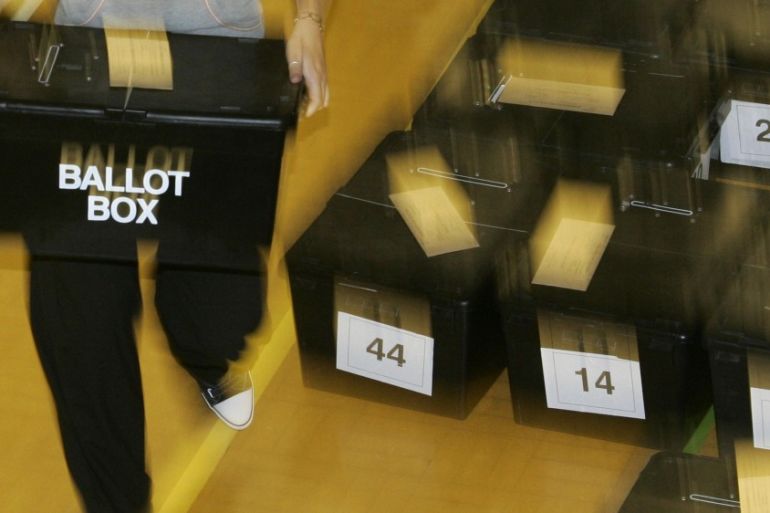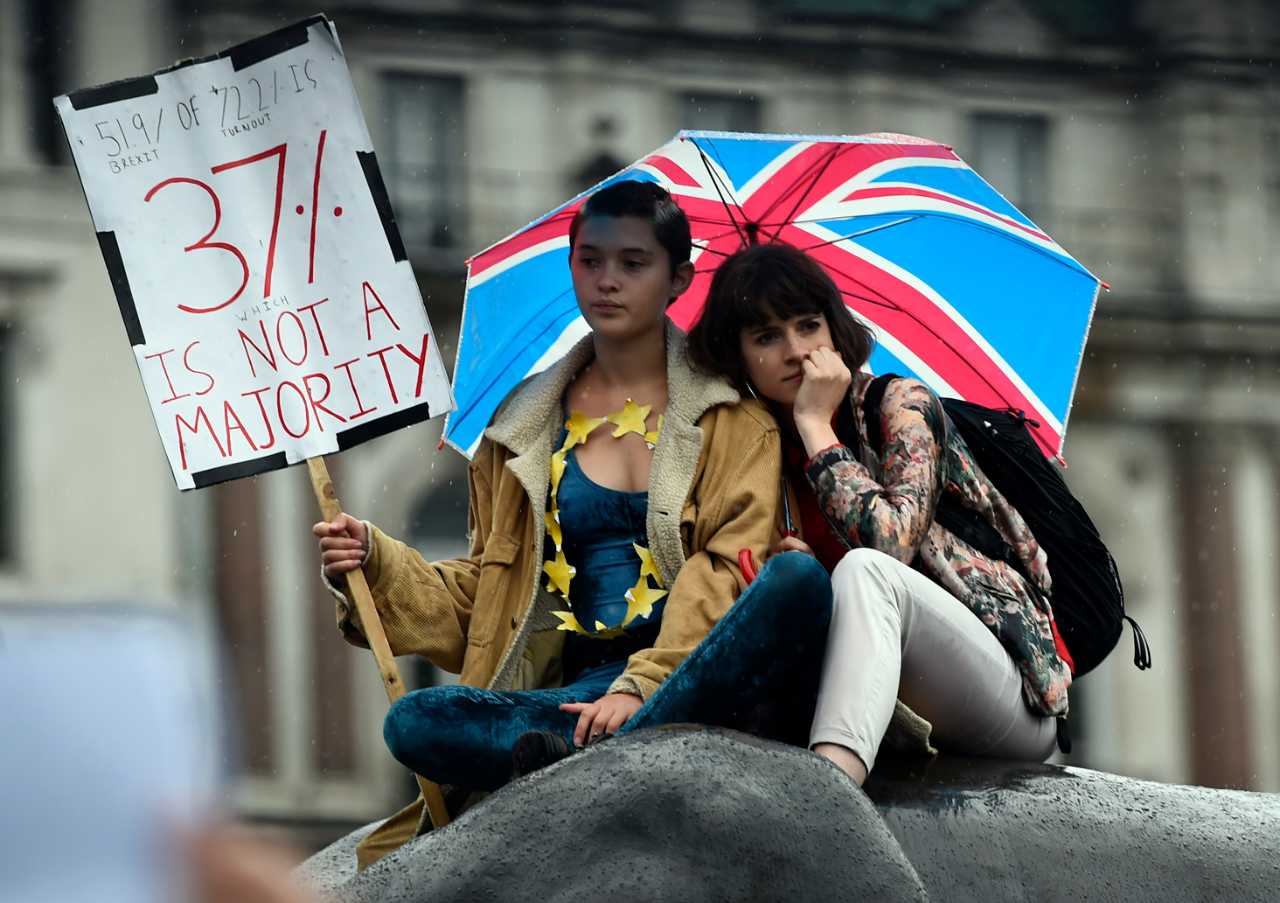Are independence referendums worth tearing a country apart?
Should major constitutional shifts require voter super-majorities to avoid bitter divisions in society?

Glasgow, United Kingdom – In August 1998, voters from Nevis went to the polls to decide the constitutional future of their tiny Caribbean island.
As part of St Kitts and Nevis, a twin-island state sandwiched between the Atlantic Ocean and Caribbean Sea, the sun-kissed territory’s relationship with its larger neighbour had become ever more fractious, prompting a push for independence.
Keep reading
list of 3 itemsIreland votes in divorce referendum
Chile to hold referendum on new constitution
The 62 percent vote in favour of secession from St Kitts was resounding – but Nevis failed to become one of the world’s smallest independent nations after falling short of the two-thirds majority that was required for the referendum result to pass into law.
“There was an element of frustration [for independence supporters], but going in we all knew what the constitutional requirement was,” Mark Brantley, the premier of Nevis, told Al Jazeera.
“It was a very high bar to be sure, but it was set that high to ensure that the overwhelming majority of the public wanted this initiative, rather than just a simple majority.”
For British supporters of the European Union, securing a two-thirds threshold in the country’s 2016 Brexit referendum would have been the stuff of dreams. As it was, a simple 52-48 percent result in favour of the “leave” was enough to end the United Kingdom’s nearly 50-year membership of the bloc.
With the country effectively split down the middle, the UK’s exit from the EU became a bitter and divisive issue in the three and half years that elapsed between the vote and the country’s official departure at the end of last month. And as British Eurosceptics became increasingly frustrated by the country’s failure to negotiate an EU-agreed framework to swiftly exit the union, pro-independence voices in Scotland – where 62 percent of voters opted to remain in the EU – ramped up calls for a second referendum on Scottish sovereignty.
Yet ongoing Brexit rancour and continuing calls for Scottish statehood – tested in a 2014 referendum which saw Scots reject independence from the British state by 55-45 percent – are but two constitutional wrangles that have made international headlines in recent years. And, as millions of pro-Europeans in the UK continue to lick their wounds, simmering questions of national sovereignty look likely to remain a noteworthy part of many political movements in nation-states worldwide.
But are binary referendums really the best way to address weighty constitutional matters such as independence? And are major constitutional shifts worth pursuing if the result will leave a people divided against itself?
“All elections are divisive, as they are meant to resolve issues of political differences in the population,” argues Simon Vallee, a 35-year-old self-declared Quebec nationalist, speaking from his home in the Canadian province.
Quebec, a predominantly French-speaking part of the Canadian state, remains a place of constitutional unease for many Canadians, despite the province voting twice against independence – once resoundingly in 1980, and the second time by a razor-thin margin of just 0.58 percent, 15 years later.
Vallee aspires to see his home province become an independent state, but says Canada’s established democratic tradition remains crucial to healing divisions resulting from any independence victory in any future sovereignty poll.
“Quebec [independence supporters] are able to live peacefully under the Canadian Federation despite their dislike of the current arrangement,” he tells Al Jazeera. “Because we accept that the rules of democracy haven’t favoured our option; I expect Canadian Federalists and patriots to display the same peaceful behaviour if we ever were to win by the rules of democracy.”

The notion that democracies are robust enough to deal with the discordant nature of referendums is a theme endorsed by Brantley of St Kitts and Nevis.
He contends the political structure of democracies – as a whole – “leads to division”; referendums are not divisive by their nature.
“In the UK, you have the Conservative Party and Labour – there’s a division there,” states Brantley, who also doubles as the St Kitts and Nevis minister of foreign affairs and aviation. “And in the US, you have the Democrats and the Republicans – that’s also a division. I don’t know if [referendums] lead to any peculiar division, it is [rather the] issue, and issues sometimes can be divisive.”
Yet, what of the Nevis-style mechanism that would require a super-majority to endorse a referendum on issues such that of independence? Five years after the 1995 referendum in Quebec, the Canadian government ruled that an unspecified “clear majority” in any future sovereignty poll would be required for a province to secede from the Canadian Federation.
“No longer would 50-percent-plus-one be deemed sufficient for far-reaching constitutional changes – in future, a stronger mandate would be required,” wrote Canadian academic Gordon Bannerman in August 2019.

In Britain, and following the deep schisms emanating from the 2016 Brexit vote, would settling any future Scottish independence referendum on the basis of a super-majority be a reasonable course of action for such a critical decision?
No, says pro-independence supporter and blogger James Kelly.
“It’s a complete non-runner,” says Kelly, author of the Scot Goes Pop! blog. “Now that we have the precedent of the UK leaving the EU on a simple majority vote, nobody would accept different rules for Scotland.”
He adds: “The cornerstone of democracy is that every vote is equal, and the unavoidable consequence of a super-majority rule is that Yes votes would be less equal than No votes.”
James Mitchell, a professor at the University of Edinburgh’s school of social and political science, agrees.
He tells Al Jazeera that, in Britain, which also saw simple majority referendums endorse the creation of the Scottish Parliament and Welsh Assembly in 1997, “one sure way to increase bitterness and rancour would be to change the rules and impose a higher threshold that clearly favours one side over the other in a referendum in future”.
Whatever the constitutional debate, and wherever in the world it takes place, aspirations for the perfect system of delivering change may remain out of reach. Yet, the necessity for successful movements of constitutional change to explicitly accommodate voters who rejected change is, say many, a worthy cause.
“A narrow win for Scottish freedom, scraped together by stoking grievance and fomenting anger, edging support over the line in the artificial heat of a campaign, is no longer sufficient,” wrote Scottish political commentator, Kenny Farquharson, after the UK’s membership of the EU officially expired last month. “It never was, if truth be told. A dirty win is not a win worth having.”